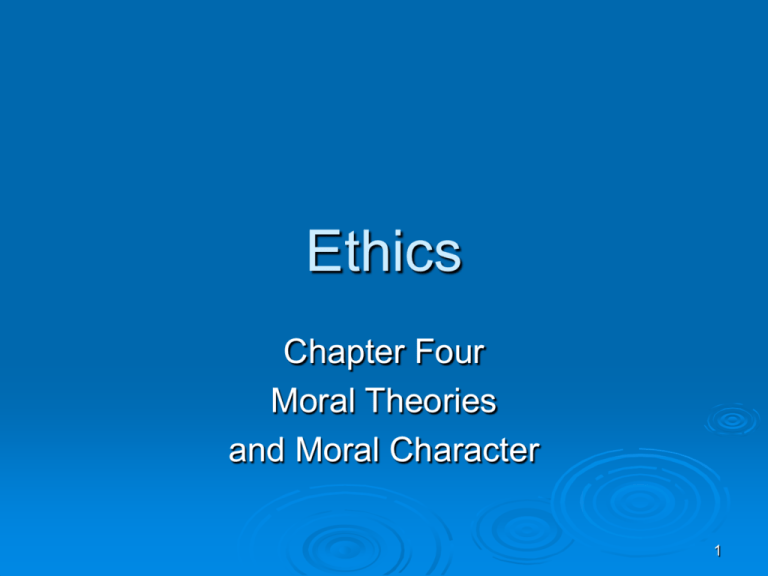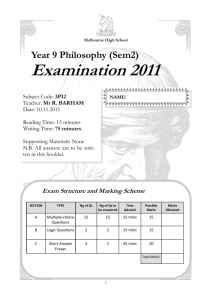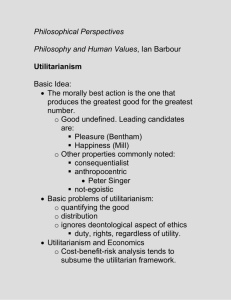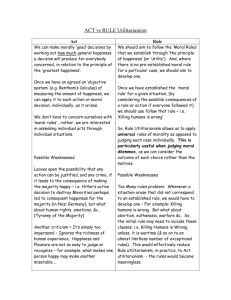Powerpoint
advertisement

Ethics Chapter Four Moral Theories and Moral Character 1 Moral Theories & Moral Character The New York Yankees and $6 Million The Promise • Give the $6 million to Steinbrenner The World Relief Organization • $6 million feeds 100,000 people dying of starvation The Dilemma • What to do with the money? 2 Moral Theories & Moral Character The New York Yankees and $6 Million Let your conscience be your guide • People’s conscience will speak to them in different ways according to how they were raised • Some people believe it is alright to commit terrorist acts • Some people would harm a fly 3 Moral Theories & Moral Character The New York Yankees and $6 Million Do whatever is most loving • Love is a wonderful value, but it is not enough to guide our actions where there is a conflict of issues • Love alone does not solve difficult moral issues 4 Moral Theories & Moral Character The New York Yankees and $6 Million Do unto others as you would have them do unto you • Or do unto others as you would have them do unto you if you were in their shoes • The Golden Rule doesn’t tell us to whom we should give the money 5 Moral Theories & Moral Character The New York Yankees and $6 Million The previous heuristics or rules of thumb frequently help us through life in ordinary moral situations But the more complicated situations, where there are conflicts of interest, these rules of thumb are limited 6 Moral Theories & Moral Character The New York Yankees and $6 Million The principle of promise keeping is called “Deontology” • Deontology is from the Greek meaning duty • The locus of value is the act or kind of act • A Deontologist would see something essentially wrong in the very act of lying 7 Moral Theories & Moral Character The New York Yankees and $6 Million The principle of giving the money to the World Hunger Relief Organization to save a large number of people is called “Teleology” • This comes from the Greek “teleos” meaning having reached one’s end or finished • The focus of value is the outcome or the consequences • A teleologist would judge whether lying was morally right or wrong by the consequences it produced 8 Utilitarianism Utilitarianism Utilitarianism is a consequentialist theory which aims at maximizing happiness or utility The greatest happiness for the greatest number was the motto of Jeremy Bentham and John Stewart Mill They promoted penal reform, animal welfare and women’s rights 9 Utilitarianism Utilitarianism Before you do anything, you should consider if the other act would promote more happiness • Under this concept what should you do with the $6 million? • What would be the greatest happiness for the most for the greatest number of people? • The bombing of Hiroshima and Nagasaki in WW II would be justified on Utilitarian grounds 10 Utilitarianism Seaman Holmes and the Longboat A decision was made that the men must be thrown overboard to save the boat and they would all perish The judge instructed the jury that the law of the sea required that passengers must always be saved in preference to seamen except those indispensable for operating the boat If passengers must be sacrificed, lots must be drawn 11 Utilitarianism Classical Utilitarianism by Bentham Of the Principle of Utility • Pleasure and pain govern us in all we do • This is the principle which approves or disapproves of every action • Either to promote happiness or oppose pain 12 Utilitarianism Classical Utilitarianism by Bentham Value of Pleasure or Pain: Measurement • The value of a pleasure or pain is measured by these four circumstances Its intensity Its duration Its certainty or uncertainty Its propinquity (closeness) or remoteness 13 Utilitarianism Classical Utilitarianism by Bentham Value of Pleasure or Pain: Measurement • The value of a pleasure or pain is further measured by: Fecundity, the chance that more pleasure will follow Purity, the chance that it will not be followed by the opposite Extent, the number of persons that will be affected by it 14 Utilitarianism Classical Utilitarianism by Bentham Value of Pleasure or Pain: Measurement • So, Bentham is saying what we do when we make a moral choice is we list all the pleasures (pros) and results on one side and then list all the pains (cons) and results on the other side • Armed with this information, we then make a decision • We may also take into account the number of people affected 15 Utilitarianism Classical Utilitarianism by Bentham Value of Pleasure or Pain: Measurement • So, Bentham is saying what we do when we make a moral choice is we list all the pleasures (pros) and results on one side and then list all the pains (cons) and results on the other side • Armed with this information, we then make a decision • We may also take into account the number of people affected 16 Utilitarianism Classical Utilitarianism by Bentham Value of Pleasure or Pain: Measurement • Can it all be so simple as this? 17 Utilitarianism A Defense of Utilitarianism by Nielsen Act Utilitarianism is a doctrine that says we ought to evaluate each act on its own merits and determine if it maximizes utility Remember “deontology” says that there are moral principles that should never be violated no matter what the consequences may be Nielsen says there are situations when the consequences should determine the morality of the act 18 Utilitarianism A Defense of Utilitarianism by Nielsen Some claim that a consequentialist’s view of ethics has implications which make such a conception of morality untenable (flawed) A consequentialist maintains that actions and moral principles are ultimately to be judged by certain consequences, that by doing them everyone involved will have greater satisfaction and less dissatisfaction 19 Utilitarianism A Defense of Utilitarianism by Nielsen Is it always wrong to kill an innocent human being, whatever the consequences of not doing so may be? Should every moral man be appalled at the judicial execution of the innocent or at the punishment, torture, and killing of the innocent • What about the interviews and detention of the Iraqi people? • What about the bombing of Japan in WWII 20 Utilitarianism A Defense of Utilitarianism by Nielsen Could or can these people harm us? • Can they carry bombs? • Can they plant bombs? • Can they conceal and support others that may harm us? • Is this subjectivism (morality of the individual at the time)? 21 Utilitarianism A Defense of Utilitarianism by Nielsen Nielsen says where the good to be achieved is great enough, he advocates violence toward the innocent It is not always wrong to advocate violence and to do so would advocate for a kind of moral absolutism 22 Utilitarianism A Defense of Utilitarianism by Nielsen The Case of the Innocent Fat Man • Is it always wrong to kill in innocent man? What would the deontologist or absolutionist say? What would the consequentialist say? Who is right and who is wrong? 23 Utilitarianism A Defense of Utilitarianism by Nielsen The Case of the Innocent Fat Man • Would the killing of the fat man set a precedent or would it haunt the perpetrators forever and make them more moral? • Killing is something which is undertaken with the greatest reluctance • It is only when it is quite certain that there is not other way to save the lives of the others 24 Utilitarianism A Defense of Utilitarianism by Nielsen The Case of the Innocent Fat Man • Blowing up the fat man is indeed monstrous, but letting him remain stuck while the whole group drowns is still more monstrous 25 Utilitarianism A Defense of Utilitarianism by Nielsen The Magistrate and the Threatening Mob • The judge is faced with a large and uncontrollable mob, demanding a culprit for a crime • Unless the criminal is produced, tried and executed they will take their own bloody revenge • But the real culprit is unknown to police 26 Utilitarianism A Defense of Utilitarianism by Nielsen The Magistrate and the Threatening Mob • There is within easy reach a disreputable, disliked and useless man • Although he is innocent, he could easily be blamed, tried, convicted and executed • To most of use this would be unacceptable 27 Utilitarianism A Defense of Utilitarianism by Nielsen The Magistrate and the Threatening Mob • By framing and executing the innocent man this would solve the immediate problem, but in the long run cause still more suffering through the corrupting effect on the institution of justice • Just like that face that we don’t negotiate with terrorists (we set a precedent and they use this against us) 28 Utilitarianism A Defense of Utilitarianism by Nielsen The Magistrate and the Threatening Mob • So, the precedent may be set, but how often would we encounter such a set of circumstances? • The lesser of two evils is to commit judicial murder of the innocent man • Is the lesser of two evils always to be preferred to the greater of two evils 29 Utilitarianism A Defense of Utilitarianism by Nielsen The Magistrate and the Threatening Mob • The Consequentialist is saying that as the world goes, there are good grounds for holding the judicial killings are morally intolerable • But the Consequentialist is not committed to denying the universality of moral judgments • If the situation is the same and the people are similar, then they should act morally, the same 30 Utilitarianism Against Utilitarianism by Williams Utilitarians frequently require us to reject conscience and our personal ideals in favor of the “lesser of two evils” This is the concept of “Negative Responsibility” We are responsible for evil if we knowingly let it happen when we could do something about it even when they require us to violate moral principles and do great harm 31 Utilitarianism Against Utilitarianism by Williams George the PhD and his family problems A chemist can get George a job, but the job requires research into chemical and biological research which is against George’s moral beliefs If George refuses the job it will go to someone who will pursue the research with vigor Should George take the job, for his family and to prohibit the other researcher from employment? 32 Utilitarianism Against Utilitarianism by Williams Jim the “Honored Visitor” has the dilemma of killing an innocent Indian rebel or having all the Indian rebels killed by Pedro What should Jim do? 33 Utilitarianism Against Utilitarianism by Williams The certainty that attaches to these hypotheses about possible effects is usually pretty low They are so implausible that it would scarcely pass if it were not being used to deliver the respectable moral answer 34 Utilitarianism Against Utilitarianism by Williams Can we ever know the psychological effects on the actors? How George or Jim will be effected if they take one course of action over the other? The effects may be bad enough to cancel out the initial utilitarian advantages of their course of action 35 Utilitarianism Against Utilitarianism by Williams Integrity • When were are measuring happiness, who’s happiness are were measuring? • Maybe the Indian rebels wanted to die, so that they would become martyrs and have ten virgins waiting for them when they died? • The decision is so determined, but what if it interferes with some project of mine 36 Utilitarianism Against Utilitarianism by Williams Integrity • So, another person actions can control your integrity? 37 Utilitarianism The One Who Walks Away from Omelas Is it acceptable to exchange all the goodness and grace of every life in Omelas for the single happiness of one? Is our happiness predicated on the suffering of poorer nations form whom we get cheap goods? 38 Utilitarianism The Utilitarian Social Engineer & the Savage The Alpha Plus Intellectuals The Beta and Delta Workers The Epsilon Minus Morons What happens when Savage attempts to bring them freedom? 39 Utilitarianism The Utilitarian Social Engineer & the Savage Would you like to live in such a world where people are happy? • They get what they want, and they never want what they can’t have • They are well off, they’re safe, they’re never ill, they’re not afraid of death… A room with everything that you could possible want would still result in a prison 40 Utilitarianism The Utilitarian Social Engineer & the Savage What happened when the Controllers cleared the island of Cyprus and populated the island with all Alphas? What happened when they gave all the workers in Ireland a four hour work day? Every change is a menace to stability Every discovery in pure science is potentially subversive (science is treated as the enemy) 41 Utilitarianism The Utilitarian Social Engineer & the Savage What would happen if we got rid of everything that was unpleasant instead of learning to put up with it • The bad makes the good, better What is everything was free, would it be worth anything • What if everyone got an A in the class, what would it be worth, a college degree? Can we claim the right to be unhappy? 42







